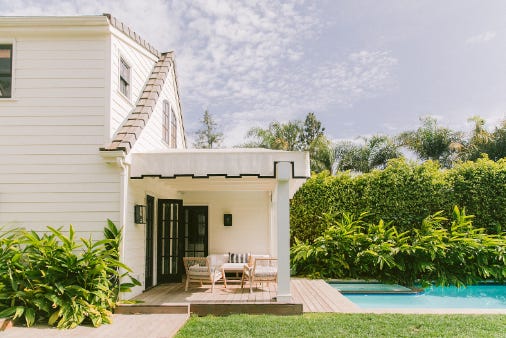rise from the ashes
It’s taken me a while to write this. Not because there isn’t enough to say, but because the words have felt tangled up in a strange knot of grief, guilt, and ambivalence. I haven’t shared the details of what my family and I have been through since January 7—not out of secrecy, but because I’ve been wary of sounding exploitative, pity-seeking, or, God forbid, like I’m asking for some kind of “woe-is-me” sympathy.
But the truth is, the Palisades Fire hasn’t just decimated what once was (our house, above) and our neighborhood; it’s upended our lives in ways I’m still grappling with, even as I type this from a makeshift setup in a borrowed space.
We’re still displaced and we don’t know where and when we will land. When you couple that with the lingering stench of smoke, the air feels more than heavy—it feels haunted. It carries a taste and texture that clings to your senses, like dragging your tongue across the inside of a cigar-filled ashtray.
But, we’ve adapted. We bought P100 masks—the serious kind that make N95s feel like dollar-store paper towels. P100s filter out the fine particulate matter still floating in the air, the invisible traces of destruction that refuse to fully dissipate.
Adapting, though, doesn’t mean settling. There’s no settling when you’re caught between wanting to rebuild normalcy and living in a state of heightened survival mode. There’s no steady rhythm when one moment you’re restocking your kids’ wardrobes and the next you’re scouring the aisles of a supermarket, juggling meal planning with the logistics of temporary housing.
I feel this strange duality: paralyzed, but constantly moving. Constantly doing. As though productivity could somehow override the grief, the gnawing uncertainty of what’s next. And at the same time, I crave routine. I crave creativity. I crave work, shopping, bargain hunting, connection, and communion.
But how do you return to normal when the catastrophe is still smoldering just outside your door? How do you embrace joy, ambition, or even just the simple act of “moving on” when the air reeks of loss and the community around you is still gasping and reeling?
There’s a kind of guilt that comes with moving forward when others can’t. When neighbors are still sorting through what’s left of their lives. The desire to not sound tone-deaf or insensitive sits heavy on my shoulders, heavy enough to silence me.
And yet, I’ve come to realize, silence isn’t the answer. Telling this story isn’t about exploiting tragedy or demanding pity. It’s about acknowledging the complexity of living through disaster—not just the immediate chaos, but the quieter, more insidious disruptions that linger long after the smoke clears.
There’s no neat conclusion here. No tidy bow to wrap this up with. The fire has left me straddling three worlds—the one I want to return, the one I’m still navigating, and the unclear future. It’s messy and uncomfortable, and at times it feels impossible.
But sharing the story? That’s one small way to make sense of it. Not just for me, but maybe for anyone else who’s standing in the ashes, trying to figure out how to take the next step forward.



Thank you so much for writing this. I am so sorry for everything you, your family, and your community are experiencing. Your work has brought so much joy and beauty to me and so many others over the years, and I am sending as much love and peace as possible.
It says so much about you that you chose to be silent at first. Someone just pointed out to me that the words 'silent' and 'listen' use the same letters. You've clearly taken in so much in your silence. I cant imagine watching the places & people I love in heartbreaking chaos. I greatly respect your perspective. Thank you for sharing such heartfelt thoughts. 🤍